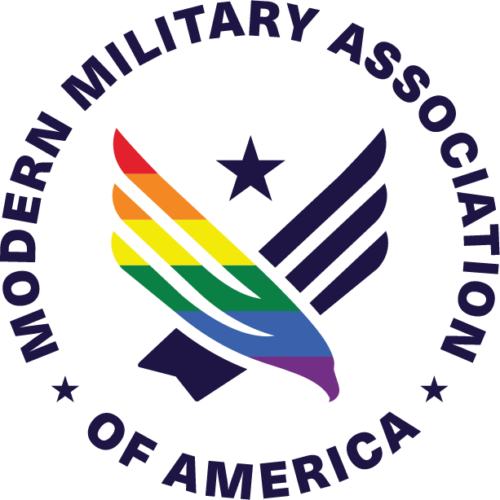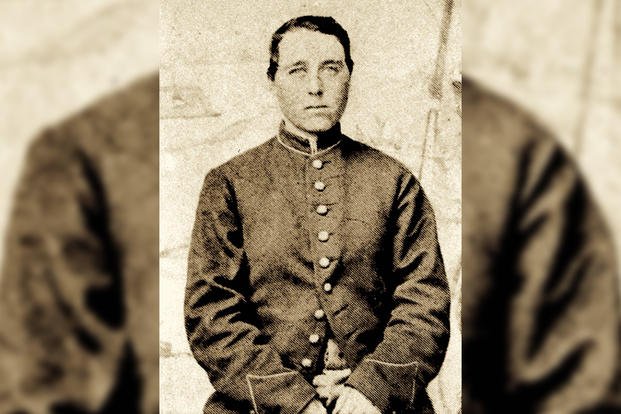Read the other blog posts in our Service Beyond Gender series:
- U.S. Navy Lt. Rae Timberlake’s Mission of Authenticity and Dedication
- As He Prepares to Teach at West Point, Captain Gordon Herrero Reflects on His Leadership Journey
- Major Alivia Stehlik’s Mission of Care and Legacy of Compassion
- Clayton McCallister’s Pursuit of Purpose and Dream of Service
- The Fight to Serve and the Future of the Force
- Nathan Casey’s Journey of Music, Leadership, and Visibility in the Marine Corps
- Major Kara Corcoran’s Leadership Amid Renewed Challenges
- Navy Commander Blake Dremann’s Ultra-Runner Mentality and Relentless Pursuit of Excellence
- Major Erica Vandal’s Legacy of Authentic Leadership and Artillery
By guest contributor Trish King
This weekend, SPARTA — a partner organization that advocates for transgender service members — hosts its annual Albert Cashier Awards in Washington, D.C. This event honors individuals who have made significant contributions to the transgender military community. In honor of its namesake, we bring you a slightly different Service Beyond Gender story.
Albert Cashier wasn’t drafted into the Union Army; he volunteered willingly. It was the summer of 1862, and driven by a profound sense of duty and hope for his adopted country, Irish-born Cashier enlisted to serve in the Civil War alongside other young men from Belvidere, Illinois.
Just 19 years old, he faced not only the mortal dangers of battle, but extraordinary personal risks. Assigned female at birth, his enlistment was a bold statement of identity in an era unprepared to accept him fully.
I find myself reflecting often on the courage it must have taken Cashier — whom scholars say would likely identify as a transgender man today — to fight a war within his own adopted country. He faced not only the universal risks of battle but also the danger of discovery — by both sides. Yet I imagine he didn’t dwell much on that fear. Cashier understood clearly what was right, counting himself proudly among the ranks of men determined to stand up for the Union.
Today, I witness that same fierce determination in the trans military community; people driven not by their gender identity, but by deep love for their country, their comrades, and the careers they’ve built. Each of us who have worn a uniform — trans or cis — feels that powerful call to serve.
Service Above Self
For me, that call came not during war, but at the same youthful age as Cashier. It was rooted in a belief that we all could shape the world into the better place we’d been promised. When I enlisted, like Cashier, I didn’t yet have language for my gender identity, but I had a deep passion for standing up to bullies. Long before I fought publicly for the right to serve openly, I stood up for the women and girls of Afghanistan. That drive — to help those who cannot help themselves — has shaped both my military service and my life.
Records reveal Cashier held complicated emotions about the war. Fiercely loyal to the Union cause, he felt pride in serving the country he’d embraced as home. Yet the brutality of combat deeply troubled him. He recalled crouching behind logs at Vicksburg, bullets slicing through the air, his sense of fear and duty intertwined. “I took pride in doing my duty as a soldier,” he would later reflect.
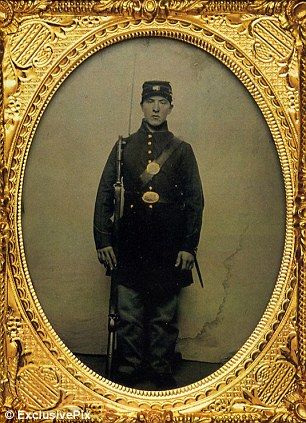
Union soldier Albert Cashier
Before I came out, I served as an infantryman, surrounded by men who saw me as just another white male in a sea of white males. I’ve heard what’s said when they think no one’s listening — about women, about queer people, about trans people. I imagine Cashier heard those same things in his tents and trenches of the Civil War. And still, like me, he stood ready to fight for the man beside him, even knowing that man didn’t see him fully.
I remember my first deployment to Afghanistan, just after 9/11. I was scared, but I also felt purpose, camaraderie, and pride. Later deployments shifted my focus from retribution to justice, to protecting those who couldn’t protect themselves. That evolution shaped my entire career. Holding all of that — identity, duty, fear, pride — was a complex task. But like Cashier, I found a way through it and cultivated a deeper commitment to advocating for others.
An Unexpected Path to Clarity
Born in County Louth, Ireland, Cashier fled poverty and the painful constraints of a life that didn’t fit. America offered economic promise and something far more precious: the freedom to be himself. By the time he reached American shores, Cashier already embraced his identity, a decision rooted in survival and self-realization.
Despite the risks of serving in silence, Cashier enlisted. “The risk was real,” he once acknowledged, but the opportunity to live authentically — even if quietly — was worth it. Ironically, military life offered him a kind of sanctuary: rigid and structured, yes, but also oddly liberating.
The structure of military service is uniquely gendered, from uniforms to housing to fitness standards. These divisions can force trans people to confront feelings they might otherwise try to avoid.
Through interviewing many trans service members for Modern Military’s Service Beyond Gender series, I’ve observed recurring themes that echo Cashier’s and my own. For many of us, the military didn’t just clarify our gender; it clarified who we are beyond that. Our sense of self became inseparable from our commitment to serve, to do what’s right, to stand up.
Cashier’s early years were shaped by hardship. As a child, he dressed as a boy to secure employment, learning early on that survival sometimes meant bending society’s rules. Those lessons in self-reliance stayed with him throughout his life.
After the war, he built a quiet life in Illinois, working as a farmhand, janitor, and lamplighter, among other jobs. Yet his greatest pride remained his identity as a veteran. He wore his Union uniform on Memorial Day parades, connecting to a time when his authenticity had a place.
I remember the moment I was finally authorized to wear the correct uniform for my gender. I had already served for 16 years — but nothing compared to that new sense of pride. For the first time, the uniform reflected not just my rank, but me. My identity. My wholeness.
Cashier’s uniform hangs in memory; mine hangs in my closet. If my family ever asked what gift I wanted, I’d say: frame it. Not for nostalgia, but because it represents the moment I became whole in the eyes of the institution I gave my life to.
I see it all the time in our SPARTA community — trans service members who are proud to wear the right uniform. They’ve worn it with honor for years, but with just a little more distinction now that it finally aligns with who they are. For me, even uniform inspections shifted from annoyance to pride. Not because the rules changed, but because I could finally see the whole soldier reflected back at me.
Maintaining authenticity in rigid systems takes vigilance. Cashier navigated it by keeping to himself, leaning on the privacy norms of his era to preserve his truth. During the Siege of Vicksburg, when he was briefly captured by Confederate soldiers, he escaped — not just to return to his regiment, but to preserve his identity.
Finding Strength in Community
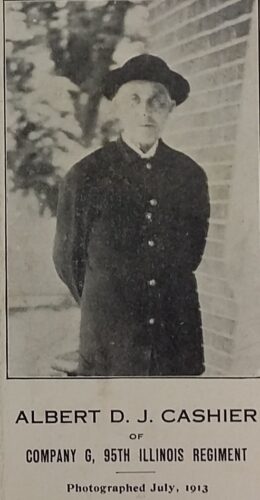
Cashier later in life
Later in life, when Cashier was hit by a car and hospitalized, his gender became public knowledge and he faced hardship and humiliation. And yet his comrades stood by him. They knew who he was. They never stopped calling him Albert.
That loyalty mattered. While he convalesced at the Soldiers and Sailors Home in Quincy, Illinois, many of his fellow veterans continued to visit him. They sat with him, brought him newspapers, and reminded him of who he was — not the person printed in headlines, but the soldier they served with. When state officials tried to strip him of dignity by forcing him into a dress and a women’s ward, those comrades pushed back.
When Cashier died in 1915, he was buried in full male uniform, under the name Albert D.J. Cashier, with military honors. His grave stands today not just as a marker of history, but as a testament to enduring respect — from his peers, from his brothers-in-arms, and now from a new generation who see him for who he truly was.
I remember when I came out, I was considered a “first.” That visibility was important, but it came at a cost. My name hit the Early Bird Brief, and former comrades started reaching out from around the world. Infantrymen I had served with — some in combat — messaged me to say what mattered: my leadership, my character, and my ability to do the job. Not one of them cared about my gender. They saw me as their fellow soldier.
Then there’s SPARTA, the largest network of transgender service members in the world. A personhood. A fraternity and sorority of warriors unlike anything the world has seen. I can go almost anywhere in the country and find a SPARTAN nearby. In a community where the pressure of our circumstances can weigh heavily, we continue to choose each other. We show up. We remind one another who we are — and vitally, that none of us are alone.
Comradeship isn’t always loud. Sometimes it’s just a message: “You were always one of us.” Sometimes it’s a person who stands beside you without needing to understand everything, only to affirm that you belong.
Cashier lived the rest of his life authentically, balancing civic engagement with quiet privacy. He voted at a time when women could not, attended veterans’ events, collected his veteran pension, and continued to serve his community. Though he never had the chance to share his truth more openly, he left the world with his name — Albert D.J. Cashier — carved in stone.
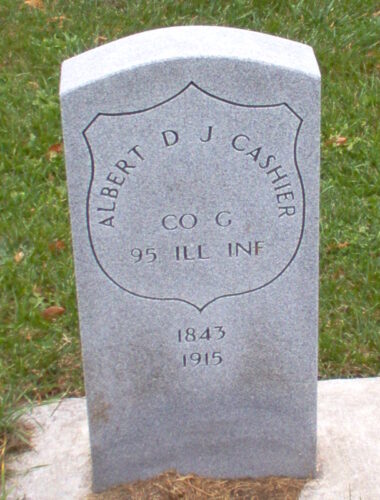
Albert Cashier’s tombstone
He hoped others would learn from his story that courage comes in many forms; that authenticity and patriotism are not mutually exclusive. He wasn’t a novelty. He was simply proof that we have always been here; serving, leading, sacrificing.
Cashier was just a dude. Transgender wasn’t a word or understood concept back in his time. But when Lincoln essentially said, “Bad stuff is happening and we need help,” Cashier said, “Count me in.” His identity as a soldier wasn’t separate from his identity as a gentleman; both forged a man of quiet principle.
When his time in uniform ended, so did a chapter, but not the story. Just as mine didn’t end, neither will those of the many service members navigating these uncertain times. Our principles shape us through our service and beyond it.
Cashier lived proudly and authentically when few even knew it was possible. A quiet first to my public one. And if he were alive today, he would be a SPARTAN — no doubt in my mind. He embodied dignity, pride, and truth in both his military service and his gender.
As I look at the fragile state of trans service today, I know the future may be fraught — but it’s unlosable. There have been so many efforts to silence us. And every time, we speak louder.
Wherever we serve, whatever we face, the pride that lived in Albert Cashier lives in our SPARTA community and the broader transgender community. It is immutable.
Once you’ve felt the light of the sun on your face, they can’t force you back into the dark.
About the author: Trish King is a retired U.S. Army infantry NCO and the first openly transgender service member in her field. She writes about military life, family, and LGBTQ+ rights, drawing from her decades of service and personal experience.
Know a veteran who’s struggling? Free help available here.
Sponsored by the Resilient Heroes Program
